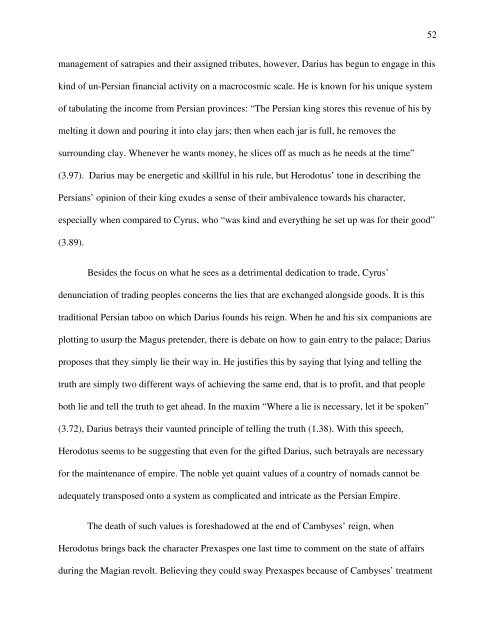The Old and the Restless - The Egyptians and the Scythians in Herodotus' Histories by Robert J. Hagan
Create successful ePaper yourself
Turn your PDF publications into a flip-book with our unique Google optimized e-Paper software.
52<br />
management of satrapies <strong>and</strong> <strong>the</strong>ir assigned tributes, however, Darius has begun to engage <strong>in</strong> this<br />
k<strong>in</strong>d of un-Persian f<strong>in</strong>ancial activity on a macrocosmic scale. He is known for his unique system<br />
of tabulat<strong>in</strong>g <strong>the</strong> <strong>in</strong>come from Persian prov<strong>in</strong>ces: “<strong>The</strong> Persian k<strong>in</strong>g stores this revenue of his <strong>by</strong><br />
melt<strong>in</strong>g it down <strong>and</strong> pour<strong>in</strong>g it <strong>in</strong>to clay jars; <strong>the</strong>n when each jar is full, he removes <strong>the</strong><br />
surround<strong>in</strong>g clay. Whenever he wants money, he slices off as much as he needs at <strong>the</strong> time”<br />
(3.97). Darius may be energetic <strong>and</strong> skillful <strong>in</strong> his rule, but Herodotus’ tone <strong>in</strong> describ<strong>in</strong>g <strong>the</strong><br />
Persians’ op<strong>in</strong>ion of <strong>the</strong>ir k<strong>in</strong>g exudes a sense of <strong>the</strong>ir ambivalence towards his character,<br />
especially when compared to Cyrus, who “was k<strong>in</strong>d <strong>and</strong> everyth<strong>in</strong>g he set up was for <strong>the</strong>ir good”<br />
(3.89).<br />
Besides <strong>the</strong> focus on what he sees as a detrimental dedication to trade, Cyrus’<br />
denunciation of trad<strong>in</strong>g peoples concerns <strong>the</strong> lies that are exchanged alongside goods. It is this<br />
traditional Persian taboo on which Darius founds his reign. When he <strong>and</strong> his six companions are<br />
plott<strong>in</strong>g to usurp <strong>the</strong> Magus pretender, <strong>the</strong>re is debate on how to ga<strong>in</strong> entry to <strong>the</strong> palace; Darius<br />
proposes that <strong>the</strong>y simply lie <strong>the</strong>ir way <strong>in</strong>. He justifies this <strong>by</strong> say<strong>in</strong>g that ly<strong>in</strong>g <strong>and</strong> tell<strong>in</strong>g <strong>the</strong><br />
truth are simply two different ways of achiev<strong>in</strong>g <strong>the</strong> same end, that is to profit, <strong>and</strong> that people<br />
both lie <strong>and</strong> tell <strong>the</strong> truth to get ahead. In <strong>the</strong> maxim “Where a lie is necessary, let it be spoken”<br />
(3.72), Darius betrays <strong>the</strong>ir vaunted pr<strong>in</strong>ciple of tell<strong>in</strong>g <strong>the</strong> truth (1.38). With this speech,<br />
Herodotus seems to be suggest<strong>in</strong>g that even for <strong>the</strong> gifted Darius, such betrayals are necessary<br />
for <strong>the</strong> ma<strong>in</strong>tenance of empire. <strong>The</strong> noble yet qua<strong>in</strong>t values of a country of nomads cannot be<br />
adequately transposed onto a system as complicated <strong>and</strong> <strong>in</strong>tricate as <strong>the</strong> Persian Empire.<br />
<strong>The</strong> death of such values is foreshadowed at <strong>the</strong> end of Cam<strong>by</strong>ses’ reign, when<br />
Herodotus br<strong>in</strong>gs back <strong>the</strong> character Prexaspes one last time to comment on <strong>the</strong> state of affairs<br />
dur<strong>in</strong>g <strong>the</strong> Magian revolt. Believ<strong>in</strong>g <strong>the</strong>y could sway Prexaspes because of Cam<strong>by</strong>ses’ treatment
















